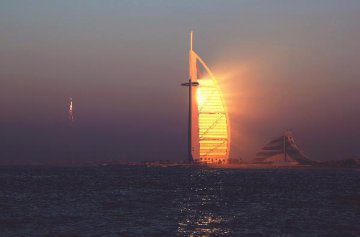The non-oil private sector of the United Arab Emirates (UAE) showed "a strong upturn" in November," the sharpest pace of expansion since August," the UAE's second biggest bank Emirates NBD said Tuesday.
The Purchasing Managers' Index (PMI) in November rose to 57.0, from 55.9 in October, the lender said in an e-mailed statement.
The PMI is a composite indicator designed to give an overview of operating conditions in the non-oil private sector economy, which accounts for 71 percent of the total economy in the Gulf state.
"The UAE's non-oil sector will likely see strong growth in the fourth quarter of this year, as both households and business will likely boost purchases before VAT (value-added tax) come into effect at the start of next year," said Khatija Haque, head of MENA Research at Emirates NBD.
From Jan. 1, 2018, the UAE and its Gulf Arab neighbors, member states of the Gulf Cooperation Council (GCC), will start to levy the 5 percent VAT for the first time since GCC's foundation in 1981, as the slump in the price of oil has turned the regional union's federal budgets from surpluses into deficits.
"Continued softness in employment and lack of wage growth suggest that any boost to household consumption this quarter will likely prove temporary" despite the improving non-oil sector, Haque added.
In terms of inflation, the average cost burdens rose at a solid pace, partly reflecting higher raw material prices, according to the statement.
The Purchasing Managers' Index (PMI) in November rose to 57.0, from 55.9 in October, the lender said in an e-mailed statement.
The PMI is a composite indicator designed to give an overview of operating conditions in the non-oil private sector economy, which accounts for 71 percent of the total economy in the Gulf state.
"The UAE's non-oil sector will likely see strong growth in the fourth quarter of this year, as both households and business will likely boost purchases before VAT (value-added tax) come into effect at the start of next year," said Khatija Haque, head of MENA Research at Emirates NBD.
From Jan. 1, 2018, the UAE and its Gulf Arab neighbors, member states of the Gulf Cooperation Council (GCC), will start to levy the 5 percent VAT for the first time since GCC's foundation in 1981, as the slump in the price of oil has turned the regional union's federal budgets from surpluses into deficits.
"Continued softness in employment and lack of wage growth suggest that any boost to household consumption this quarter will likely prove temporary" despite the improving non-oil sector, Haque added.
In terms of inflation, the average cost burdens rose at a solid pace, partly reflecting higher raw material prices, according to the statement.





















Latest comments